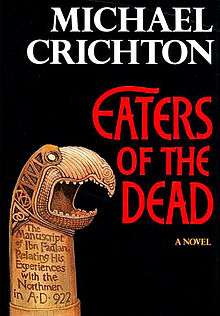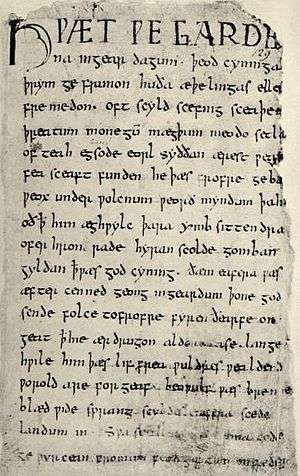Eaters of the Dead
|
First edition cover | |
| Author | Michael Crichton |
|---|---|
| Cover artist | Paul Bacon |
| Country | United States |
| Language | English |
| Genre | Plausible historical novel |
| Publisher | Knopf |
Publication date | March 1976 |
| Pages | 288 |
| ISBN | 0-394-49400-8 |
| OCLC | 1959473 |
| 813/.5/4 | |
| LC Class | PZ4.C9178 Eat3 PS3553.R48 |
| Preceded by | The Great Train Robbery |
| Followed by | Congo |
Eaters of the Dead: The Manuscript of Ibn Fadlan Relating His Experiences with the Northmen in AD 922 (later republished as The 13th Warrior to correspond with the film adaptation of the novel) is a 1976 novel by Michael Crichton. The story is about a 10th-century Muslim Arab who travels with a group of Vikings to their settlement.
Crichton explains in an appendix that the book was based on two sources. The first three chapters are a retelling of Ahmad ibn Fadlan's personal account of his actual journey north and his experiences with and observations of Vikings (probably from Sweden). The remainder is based upon the story of Beowulf.
Plot summary
The novel is set in the 10th century. The Caliph of Baghdad, Al-Muqtadir, sends his ambassador, Ahmad ibn Fadlan, to the king of the Volga Bulgars. He never arrives but is instead conscripted by a group of Vikings to take part in a hero's quest to the north. Ahmad ibn Fadlan is taken along as the thirteenth member of their group to comply with a soothsayer's requirement for success. There they battle with the 'mist-monsters', or 'wendol', a tribe of vicious savages (suggested by the narrator to have been possibly relict Neanderthals) who go to battle wearing bear skins.
Eaters of the Dead is narrated as a scientific commentary on an old manuscript. The narrator describes how the story told is a composite of extant commentaries and translations of the works of the original story teller. There are several references during the narration to a possible change or mistranslation of the original story by later copiers. The story is told by several different voices: the editor/narrator, the translators of the script and the original author, ibn Fadlan, as well as his descriptions of stories told by others. A sense of authenticity is supported by occasional explanatory footnotes with references to a mixture of factual and fictitious sources.
Sources and inspiration
In an afterword in the novel Crichton gives a few comments on its origin. A good friend of Crichton's was giving a lecture on the "Bores of Literature". Included in his lecture was an argument on Beowulf and why it was simply uninteresting. Crichton stated his views that the story was not a bore and was, in fact, a very interesting work. The argument escalated until Crichton stated that he would prove to him that the story could be interesting if presented in the correct way.
In a seemingly offhand reference, Abdul Alḥaẓred's Necronomicon (of H. P. Lovecraft fame) is quoted in the in-character bibliography.
Reception
The critic from the New York Times called it "diverting but disappointing".[1] The Chicago Tribune said it was "funny, fascinating and informative".[2]
Film adaptation
In 1979 it was announced the movie version of the novel would be made by the newly formed Orion Pictures with Crichton himself to direct.[3] This did not occur.
The novel was adapted into film as The 13th Warrior (1999), directed by John McTiernan and released by Walt Disney Pictures through its Touchstone banner. Crichton himself did some uncredited directing for a reshoot after Disney fired McTiernan for various reasons, one of which was going far over budget. Antonio Banderas played Ibn Fadlan. Crichton writes that he was "quite pleased" with the film, though it earned mixed reviews and performed poorly at the box office, earning about $62 million worldwide; the film's budget was more than $100 million.[4]
Further reading
- Crichton, Michael. "A Factual Note on Eaters of the Dead" in Eaters of the Dead. New York: Harper, 2006. 245-52. ISBN 9780061782633.
References
- ↑ With real and bogus footnotes: Eaters Of the Dead By JACK SULLIVAN. New York Times (1923-Current file) [New York, N.Y] 25 Apr 1976: 253.
- ↑ Crichton's creative play: Eaters of the Dead Oberbeck, S K. Chicago Tribune (1963-Current file) [Chicago, Ill] 25 Apr 1976: f6.
- ↑ Orion: A Humanistic Production Kilday, Gregg. Los Angeles Times (1923-Current File) [Los Angeles, Calif] 05 Jan 1979: f13.
- ↑ Dirks, T. 2010. Greatest Box-Office Bombs, Disasters and Flops of All-Time. [Online] Filmsite.org (Updated 2010) p.11. Filmsite.org.

